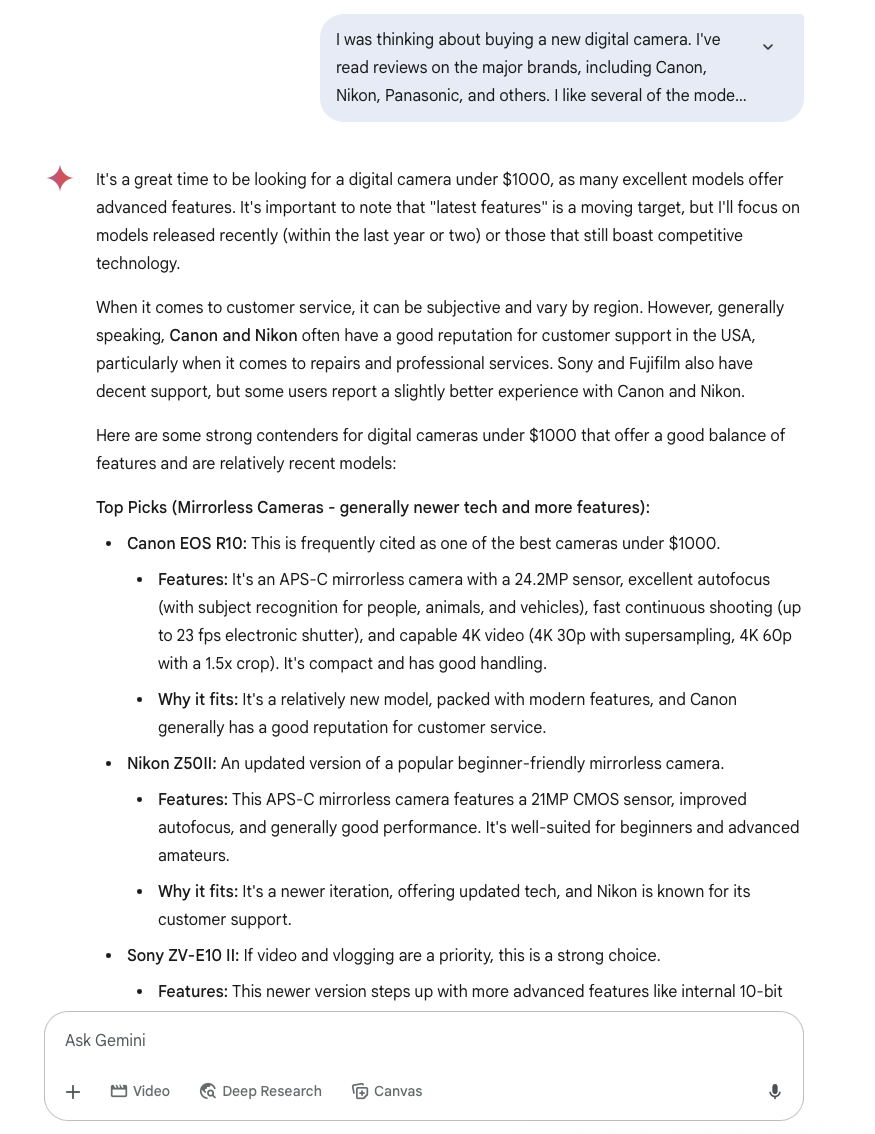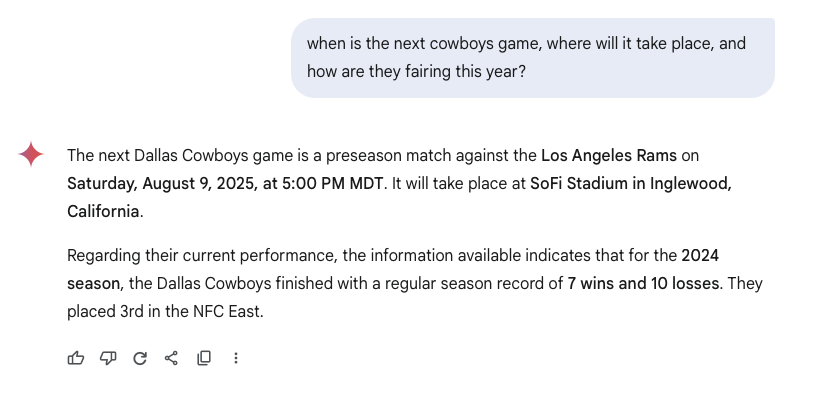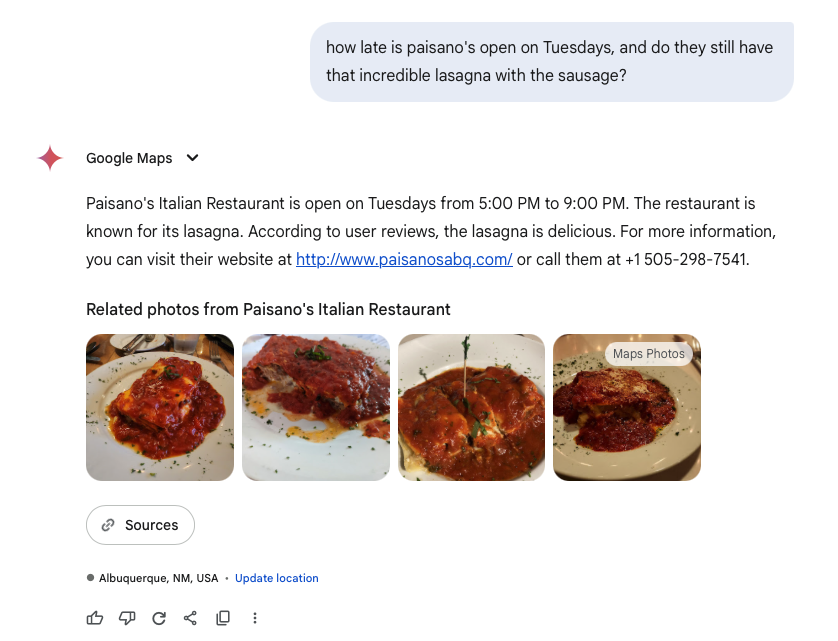Introduction
Traditional search is fast and often accurate, but there are those occasions when using it can feel like a wild goose chase. Some queries you send to Google.com go down a dead-end path without ever finding the information you need.
Traditional Search
This is where large language models (LLMs) like Gemini, ChatGPT, Perplexity, and others come into play. They are trained with vast amounts of data, and they understand, generate, and respond to human language in a coherent and contextually relevant way. In addition to their training, they also extend their capabilities to search the broader Internet in real-time. The end result is they often find information traditional search is unable to.
AI Search
AI search usually takes a bit longer than traditional search, but it ultimately responds with comprehensive and generally factual information. And it summarizes it for you instead of just displaying a list of possible websites that may or may not have the information you need.
A Detailed Response from a Google Gemini Search
But why is AI search better than traditional search?
Context
- Traditional search is brute force, relying on keywords. If the search terms aren't precise enough, or if what you're looking for includes complex relationships or implied meaning, you'll likely receive irrelevant search results. This is because traditional search struggles with ambiguity.
- AI search can better understand the intent of a query even if the relevant keywords aren't included. It uses natural language processing (NLP) to determine context, relationships between words, and more. Which means you can be more expressive with your prompt, ask in a more conversational manner, and get better responses.
Synthesis
- Traditional search returns a list of links. You are responsible for traversing them to find what you need and make sense of it.
- AI search checks multiple sources, collates the information it finds, summarizes it, and responds with a direct answer. This saves considerable time, especially for complex queries.
Complexity
- Many times you need to ask multiple, dependent questions, and traditional search can only handle one query at a time.
- AI search can easily deal with multiple questions, whether they are dependent on one another or not, and still return appropriate responses.
Generative capabilities
- Traditional search can't generate new content—It can only return what it finds. This limits its usefulness, because if it can't find what you're looking for, it will return irrelevant results.
- AI search can summarize, explain, draft e-mails, write code, brainstorm ideas, and more. It understands your prompts and generates content based on what you ask it, using its training and outside sources to return the best possible results.
Interactivity
- Traditional search requires multiple queries to receive multiple responses, and each is independent of one another
- AI search retains context, which means follow-up questions can refine previous responses, or provide additional information. It's conversational and intuitive, and allows you to continue querying to get more information about the same or a related topic.
Fact-checking
- AI is excellent at cross-referencing information from multiple, credible sources and provides reliable and fact-checked answers that traditional keyword search can't match.
So while AI search won't replace traditional search in the short term, it's already significantly better in many situations. Over time, as it improves in accuracy and performance, it will likely become the default method to search the Internet.
A Multi-Part Question and an AI Response
The Downside of AI
AI search isn't perfect, and likely never will be. Here are some of its current limitations:
- Hallucinations - When AI can't find the answer, it might invent it. And since its responses will sound reasonable, it's up to you to verify the information. And while traditional search can't generate false information, it returns what it finds based on the keywords given it, from websites, forums, and elsewhere, and that information can be incorrect. So regardless of where or how you find information online, it's always important to confirm the facts before using it.
- Source transparency - AI search doesn't always list its sources, which can make it difficult to track them down, attribute them, etc. Some AI search engines, like Perplexity, do go out of their way to include information about sources.
- Real-time information - AI search can't keep up with late-breaking news, while traditional search can and does. This is why traditional and AI search are both important.
- Niche queries - For some topics, traditional search is always better. It's important to try both AI and traditional search when gathering information in order to find all the best and most relevant information.
Summary
Artificial intelligence supercharges search and makes it more valuable than it's ever been. It leverages the power of a large language model trained with immense amounts of data while also searching the wider Internet to provide the best possible responses. It's able to understand context and handle complex queries, generate responses, synthesize information, and do it all interactively and accurately.
So the next time you need to know something, especially for complex or conversational queries, consider using AI. You can ask it anything, from what's the difference between Medicare part A and B , to what coffee maker brand is the most reliable and has the best customer service. Or, how late your favorite italian restaurant is open and do they still sell that amazing pasta dish you love.
AI search can find the information quickly and reliably.
Ai Response to a Multi-Part Question About a Local Restaurant
Looking for more information about technology and music? Visit the Gary Lucero Writer website and join my mailing list. I send out a bi-weekly newsletter that discusses technologies such as AI, rock and progressive rock music, and I sometimes delve into philosophical topics.
You can find me on Instagram, Facebook, and YouTube, and I host a podcast on a variety of sites, including:
Apple Podcasts
Podbean
Amazon Music
iHeartRadio
PlayerFM
Podchaser
If you want to reach me using e-mail, send me a message at contact@garylucerowriter.com.






